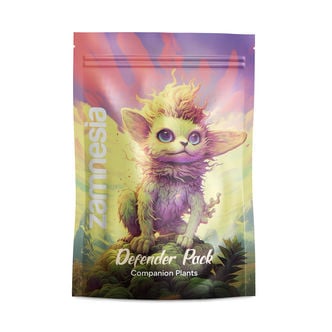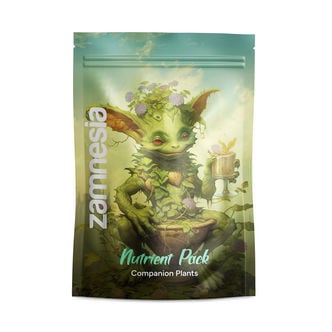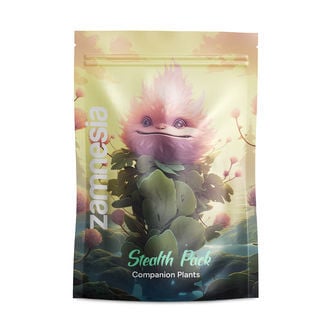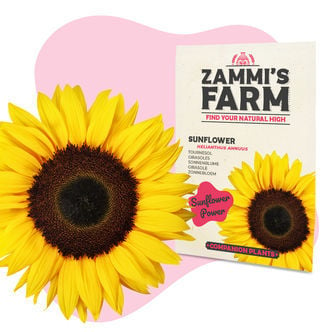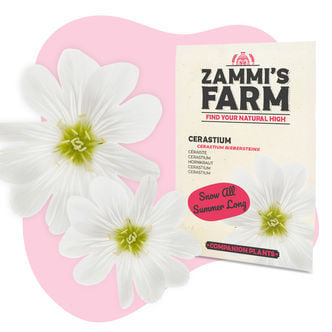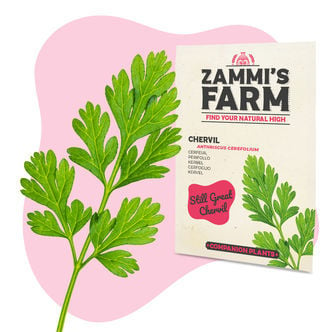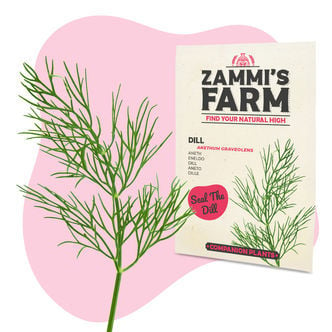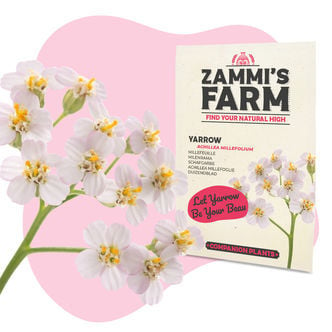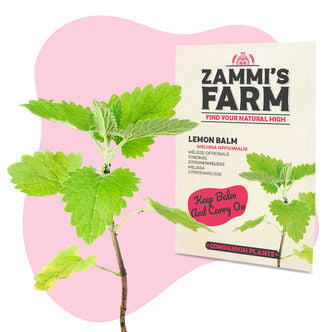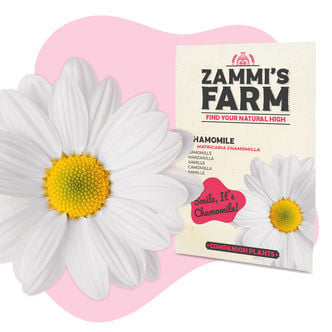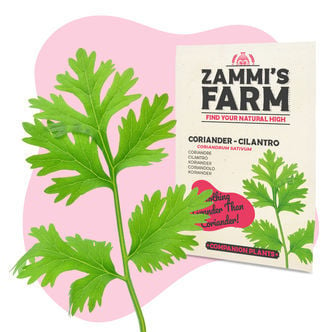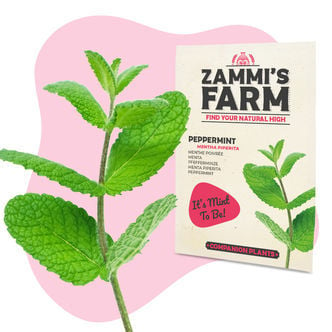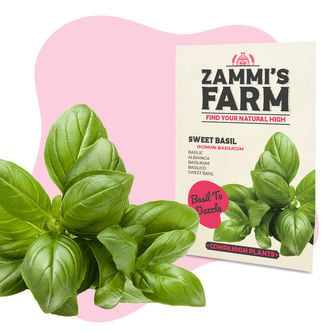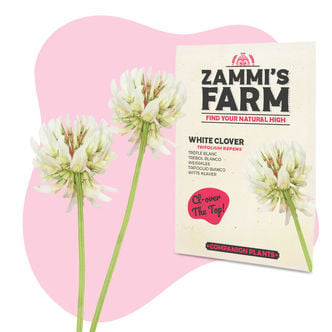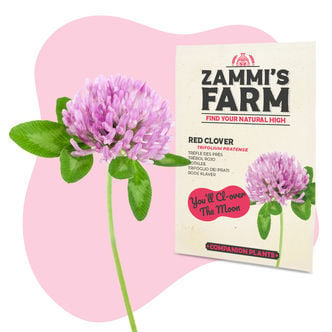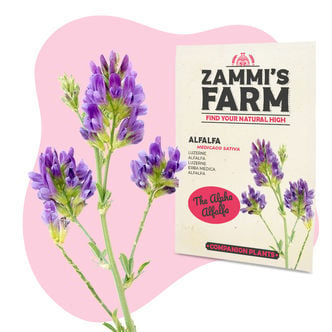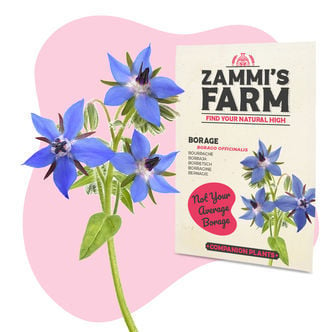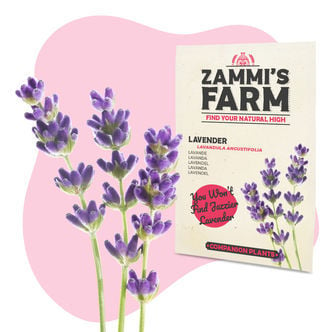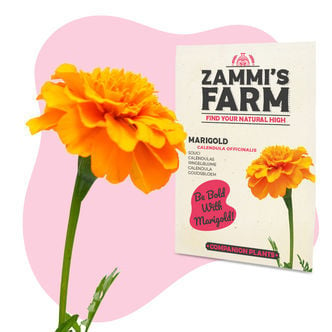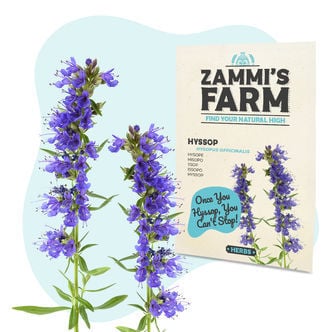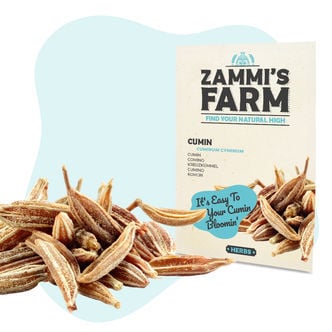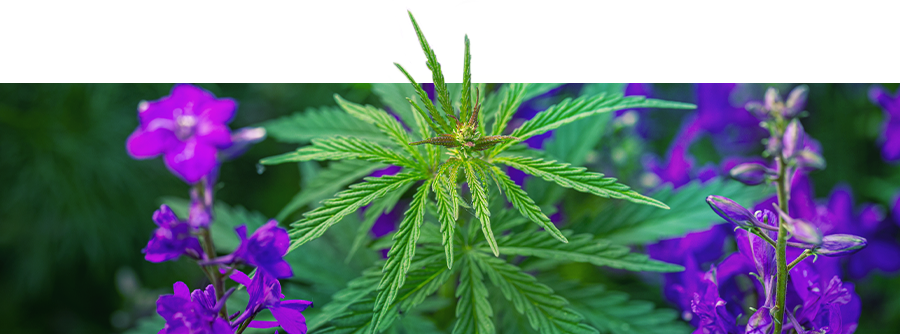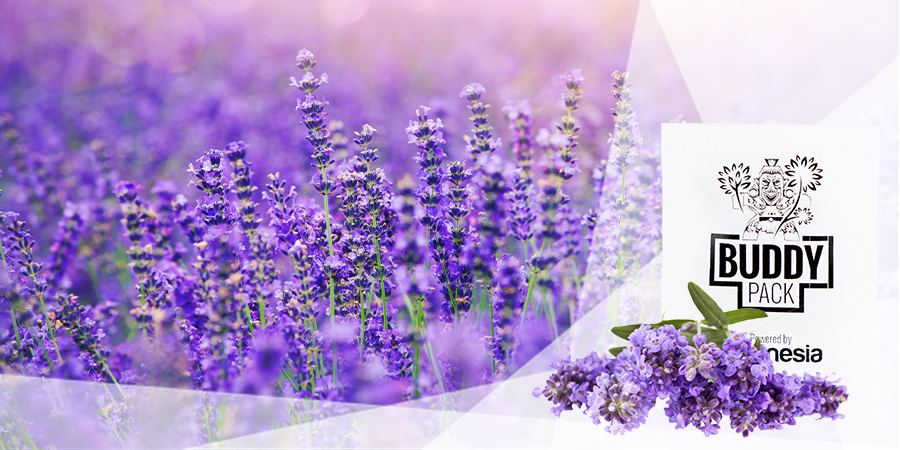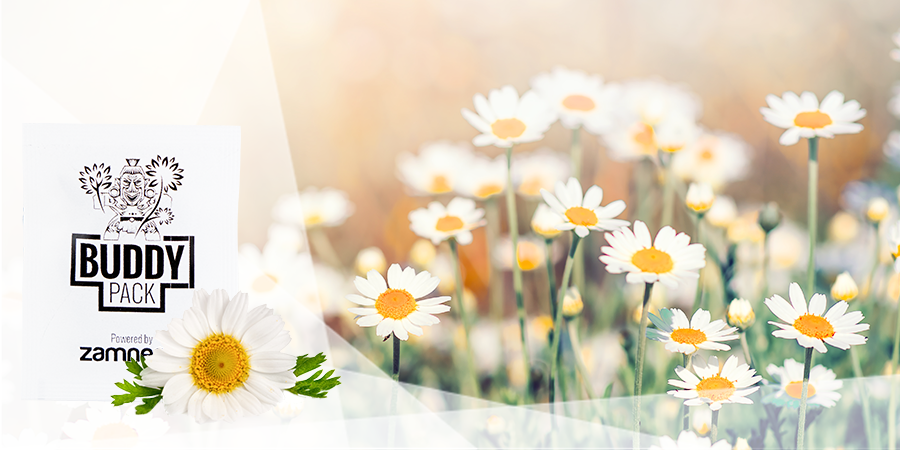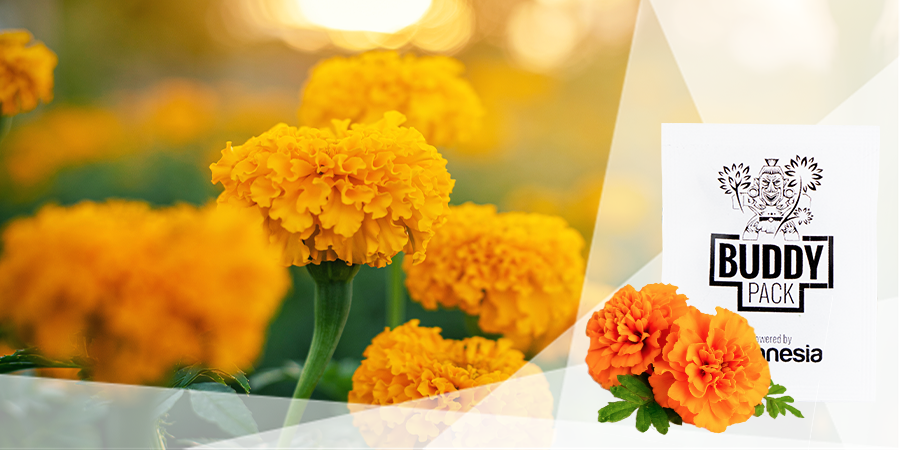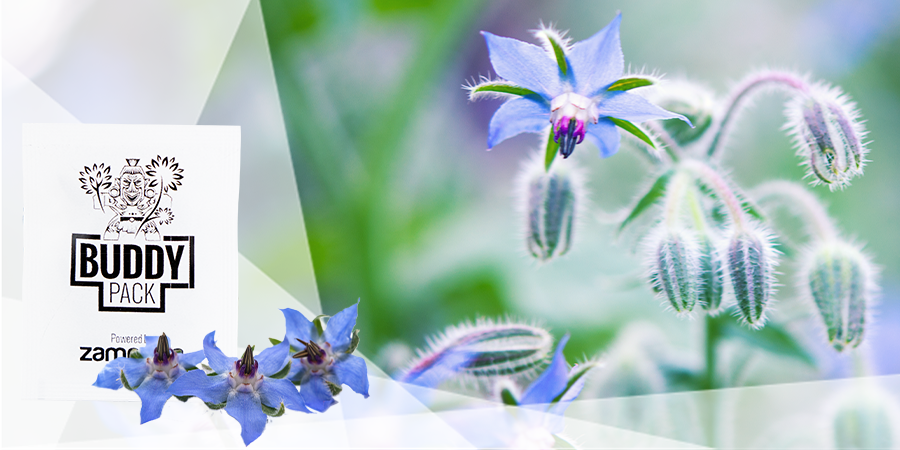Companion Plants
Growing companion plants alongside with your cannabis plants can provide many benefits. How about getting the perfect stealth grow going by hiding your precious herbs from nosy neighbours or providing your plants with protection from wind and weather? Companion plants can also provide natural pest and bug control and they can help support your plant’s nutrition needs and good health. In our companion planting category you can find anything that you need to get the perfect companions for your cannabis grow no matter whether your grow indoors or outdoors!
Companion Plants - Click here for more infoBuddy Mix Pack DEFENDER
These companion plants will work to defend your grow in several ways. They do keep some marauders away on their own. Even better? They also attract insects and bugs that defend your cannabis.
Buddy Mix Pack SCARE
This collection of companions will literally scare the “baddies” away. Most of these plants have either a high odour or emit oils that literally act as a natural insect repellent. Plant them together around your cannabis for a colourful but protective garden.
Buddy Mix Pack NUTRIENT
The plants in this nutrient pack are great for improving the soil and surrounding environs of your cannabis plants. Some allow the plant to be supported by a root structure that increases drainage. Others literally act as natural, living mineral injectors, starting with nitrogen.
Buddy Mix Pack STEALTH
These strategic plants all do several things. They tend to be large and concealing or have a strong odour to cover up the smell of cannabis. They also tend to be either super pretty, smell or look great, and even taste delicious. For that reason, this is a must-have bag of tricks for any canna farmer needing concealment and protection.
Sunflower (Helianthus annuus) Buddy Pack
A motif recognized worldwide, the sunflower is really thousands of smaller flowers all arranged in a pretty pattern designed to attract insects. It is ideal as a companion plant for cannabis.
Cerastium (Cerastium biebersteinii) Buddy Pack
Quite tough as an edge plant and eager to spread and be a complete ground cover, Cerastium is an ideal choice when planning your organic cannabis garden.
Chervil (Anthriscus cerefolium) Buddy Pack
Chervil is a shade loving annual that produces umbels of delicate white and pale magenta flowers. Chervil imparts vigour to its neighbouring plants including cannabis and is a useful culinary herb.
Dill (Anethum graveolens) Buddy Pack
Dill will keep spider mites away from your weed and make you a star in the kitchen. Easy to grow and a good companion to most plants.
Yarrow (Achillea millefolium) Buddy Pack
Ornate and one of the great attractors Yarrow adds a mad splash of colour and a bug barrier of superb strength and reliability. Easy to grow and wonderfully beneficial to any companion garden.
Lemon Balm (Melissa officinalis) Buddy Pack
Lemon Balm is an infinitely useful companion plant for cannabis. Vigorous and easy to grow it is a beneficial addition to any herb garden.
Chamomile (Matricaria chamomilla) Buddy Pack
Hardy and easy to grow or transplant the small and pretty Chamomile plant strengthens growth of neighbouring plants and is an ancient folk medicine.
Coriander (Coriandrum sativum) Buddy Pack
For thousands of years Coriander has been a medicine of renown and a favourite spice throughout recorded history. Coriander keeps pests at bay and enhances healthy growth of neighbouring species.
Peppermint (Mentha piperita) Buddy Pack
Peppermint should be on your top ten cannabis companion and infinitely useful plant list. A jug of mojitos just wouldn't be the same without a handful of home grown crushed peppermint.
Sweet Basil (Ocimum basilicum) Buddy Pack
Sweet basil loves a warm sunny spot and will reward you with lush green foliage during the warm months.
White Clover (Trifolium repens) Buddy Pack
White Clover carpets accompanied by buzzing bees and flirting butterflies will help fix nitrogen in your soil. Cannabis and the other companion plants respond with vigorous green growth when White Clover is used as a companion plant.
Red Clover (Trifolium pratense) Buddy Pack
Red Clover is a well respected companion plant on the farm and in the backyard. Fixing atmospheric nitrogen for slow release later is its speciality while creating a carpet of living mulch.
Alfalfa (Medicago sativa) Buddy Pack
Alfalfa fixes nitrogen, iron, magnesium, phosphorus and potassium and can be made into a sprayable tonic that encourages growth in other species of plants including cannabis.
Borage (Borago officinalis) Buddy Pack
Borage adds vitamins and minerals to the soil medium as it grows. You will get fat strawberries and fatter buds companion lanting with Borage.
Lavender (Lavandula angustifolia) Buddy Pack
A principal therapy in the human apothecary for millenia, lavender doubles as a hardy companion plant that fills the air with a delicious fragrance that attracts bees and other cannabis buddies.
Marigold (Calendula officinalis) Buddy Pack
Marigolds are a growth booster for surrounding plants and deter a host of bugs from your precious cannabis while displaying showy orange flowers.
Pot Markers (Zamnesia) 5 pcs
Cleanliness is next to godliness. When growing several plants of different strains, it is crucial to keep everything well-organized. These pot markers will help you with this task. Write all the required data on them ... date of sowing, strain, required EC-level and so on and you will never confound your precious babies again. Content: 5 pcs. Dimensions: 12 x 4,5cm.
Geotextile Fabric Wall Planter (10L)
These 10L geotextile Wall Planters from Gronest are made from 100% recycled material and are perfect for flowers and plants that love to hang. The fabric has many benefits and it allows for great aeration and run off, leading to healthy roots for your plants. Go vertical and create a garden right on your wall with Gronest's eco-friendly Wall Planters.
Hyssop (Hyssopus officinalis) Seeds
Hyssop, or Hyssopus officinalis, is part of the mint family and traditionally found in southern Europe and the Middle East. This shrub is quick to grow and needs to be sown in moist soil under full sun in the early summer months of June onward. With harvests as early as August, the flowers and leaves of this plant have a range of culinary and holistic uses worth exploring.
Cumin (Cuminum cyminum) Seeds
Cumin needs long, hot seasons to produce seeds to propagate and use in cooking. Start your seedlings off early (4 weeks before the last frost), and bring them outside once temperatures sit above 15°C. Grow your plants in full sun and water sparingly. They'll begin flowering in mid-summer and be harvest-ready after roughly 120 days. Use dried cumin seeds to season meats, stews, curries, and...
Information About Companion Planting For Cannabis
Growing different plant species next to your cannabis can help keep them healthy, pest-free, and even increase their yields at the end of the growing season.
Humans have practised companion planting for thousands of years. The term simply refers to planting numerous species in close proximity. Take a walk in the forest. What do you see? A whole load of different plants hanging out in harmony, with almost no rigid structure in place.
You’ll also see the same growing pattern in permaculture settings. Known as a polyculture, raising different plant species close together offers protection from disease and enhances biodiversity while attracting beneficial bugs.
Vegetable gardeners will be familiar with companion planting. Some species perform extremely well together. For example, squash, beans, and corn form an ancient triad known as the “three sisters” thanks to their successful synergy. Nasturtiums work wonderfully alongside cucumbers, whereas basil brings in pollinators to help out your tomatoes.
But companion planting doesn’t mean throwing in a bunch of seeds and hoping for the best. Some species just don’t get along too well. Raising the wrong plants close together can result in disappointing yields and poor plant health. Artichokes don’t like being close to beans and peas, and beetroots would rather not hang out with runner and pole beans.
Growers also use companion planting with great success in cannabis gardens. The pungent aroma of growing cannabis plants attracts all manner of unwanted insect and human attention. Companion plants can help disguise this characteristic smell. Many species can also protect your cannabis plant, improve the soil, and act as allies in the constant battle against pests.
WHAT ARE COMPANION PLANTS FOR CANNABIS?
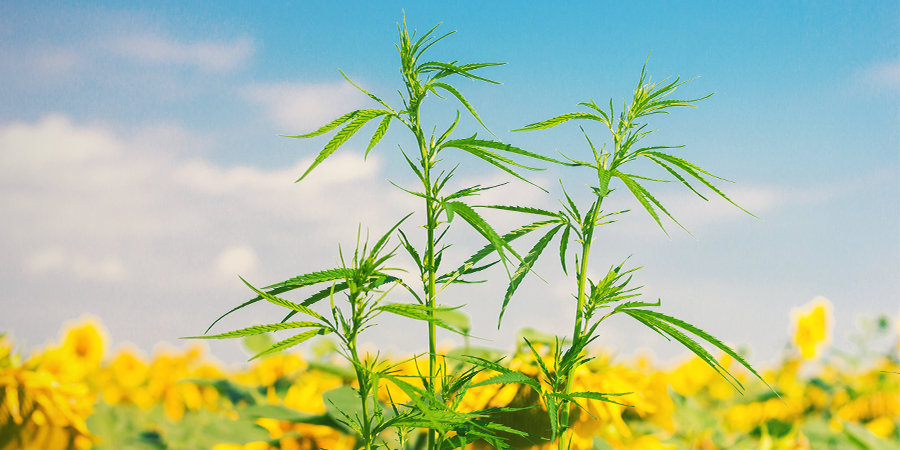
Various companion plants work particularly well as nearby plants to cannabis, promoting a healthy—even clandestine—growing environment. Nature usually has the answer to most of our issues, both in and out of the cannabis garden. A companion plant can replace harmful chemicals and digging practices that disturb soil life.
Companion planting offers a holistic and closed-loop strategy. At the end of the cannabis growing season, they either end up in your tea mug, on your dinner plate, or on the compost pile. We’d call that a win-win situation in any scenario!
WHY USE COMPANION PLANTS?
First and foremost, companion planting protects your cannabis plant. Growing outdoors has many advantages, but increased likelihood of pests and pathogens aren’t one of them. Aside from helping to prevent crop devastation, they also help to increase the beneficial life in your soil and garden as a whole. Discover the main reasons you should start companion planting during your cannabis grow below.
DETER HARMFUL INSECTS
Terpenes are one of the main reasons any grower cultivates cannabis. Aside from underpinning the gorgeous smell of the herb, they contribute to the unique psychoactive effects of each cultivar. However, we’re not the only species that appreciates the smell—even the taste—of cannabis.
Many minute critters enjoy chomping on cannabis leaves, stems, and roots. Some growers opt to spray down their garden with harmful chemicals, although most cultivators shudder at this approach.
Others craft natural concoctions to deter pest species. However, companion planting offers a less interventionist and more holistic approach. Sure, cannabis smells wonderful. Who can deny that? But other plants also emanate pungent aromas.
These species produce powerful aromatic molecules that work as natural insect repellants. They act as a sort of biological shield. Cool, right?
Of all the common cannabis pests, the main culprits include thrips, fungus gnats, whiteflies, aphids, leaf miners, and spider mites.
Some of the best companion plants to deter these pests include:
- Sweet Basil
- Coriander
- Lavender
- Chervil
- Marigold
The Zamnesia Scare Pack contains all of these protective species. Scatter these seeds around your garden beds and containers to deter pests that will otherwise snack on your plants.
ATTRACT BENEFICIAL INSECTS
Not all insects are bad. In fact, nearly all life on Earth depends on these lifeforms for their survival. Companion plants attract a host of beneficial insects to your garden that will actively hunt down pest species.
Protective plants found in the Defender Pack are especially helpful, adding another layer to your biological defences. See which plants attract these insect allies below.
- Dill: attracts parasitic wasps that hunt down a range of insect pests
- Yarrow: draws in lacewings that hunt aphids, mites, and whiteflies
- Chamomile: attracts ladybugs to the garden, which eat around 5,000 aphids in their lifetime
- Lavender: attracts hoverflies that control aphids
- Sunflower: attracts ladybugs and spiders
HIDE YOUR CANNABIS GROW
Insects are often low on the list of concerns when it comes to growing outdoors. Many cultivators raise their plants in areas where the law doesn’t tolerate such actions. Patrolling law enforcement and nosey neighbours will end your grow quicker than a whirling cloud of whiteflies.
Luckily, nature has the answer once again. Many companion plants serve up terpene profiles so pungent that they mask the scent of cannabis in the air. These species include:
- Lemon balm
- Lavender
- Peppermint
- Marigold
- Sunflower
You can find all of these species in our specially designed Stealth Pack. The size and beauty of some of these plants will also help draw attention away from your cannabis plants. Pairing small autoflowering strains with these species will keep your grow on the down-low.
PROVIDE NUTRIENTS AND IMPROVE SOIL STRUCTURE
Believe it or not, there’s more! Companion planting will also improve the health, structure, and biodiversity of your soil, which means healthy plants all around. Good soil structure promotes root aeration, prevents erosion, and increases drainage.
Other species introduce nitrogen into the soil. Most plants rely on fixed nitrogen present in the soil in the form of ammonia and nitrate. However, some plants fix nitrogen from the atmosphere and use it as a fertiliser themselves. Well, we can thank microbes (once again) for doing the hard work here.
Rhizobium bacteria team up with the roots of certain plant species. In return for sugars created through photosynthesis, the microbes fix nitrogen required by the plant. Plants then leave nitrogen in the soil, making it available to other plants. They can also be “chopped and dropped” to form a nitrogen-rich mulch layer.
Species that fix nitrogen and enhance soil structure include:
- Borage
- White clover
- Red clover
- Alfalfa
- Cerastium
All of these species come in the Zamnesia Nutrient Pack.
ALTERNATIVE USES OF A COMPANION PLANT
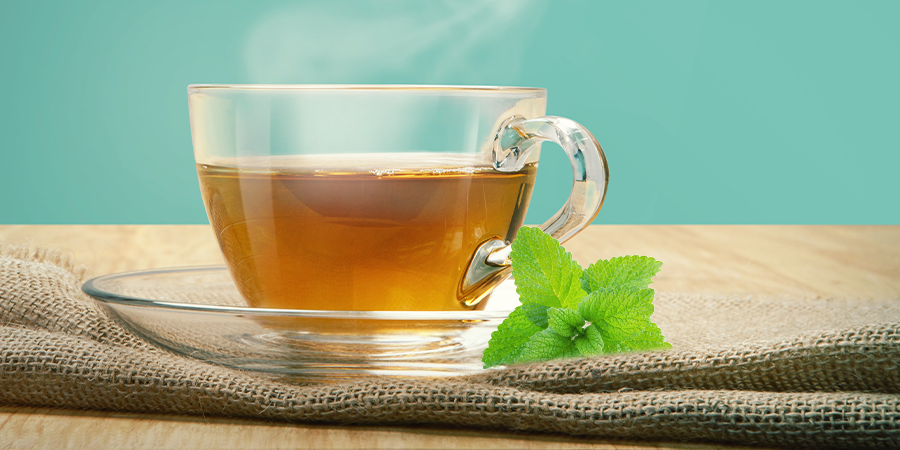
Companion planting offers benefits outside of the cannabis garden. Not only do these species help cannabis plants thrive, but some can be eaten and used in teas. This means no part of your garden goes to waste.
Companion plants such as coriander, dill, and basil add some serious taste to soups, salads, and pasta dishes. Species such as lavender, chamomile, and lemon balm make soothing teas.
HOW TO INCORPORATE COMPANION PLANTING IN YOUR CANNABIS GROW
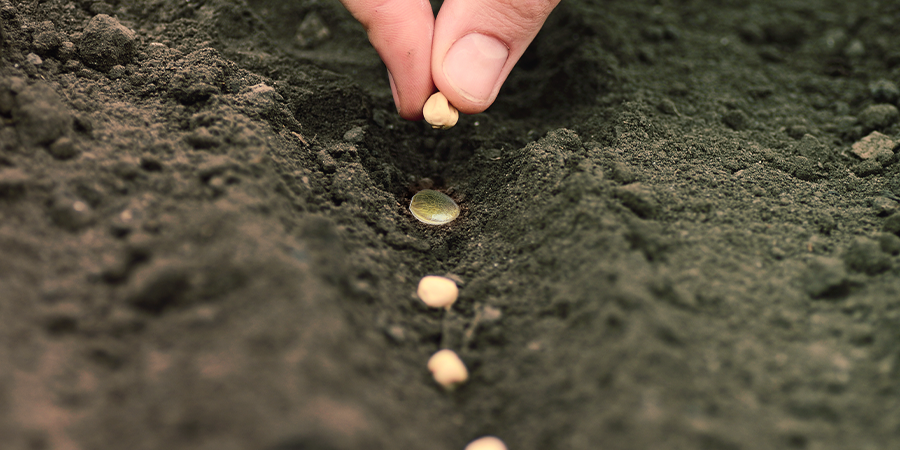
A companion plant doesn't require much work or attention. They are there to help improve the quality of your cannabis and shouldn’t take up too much of your time. You can sow most species directly into garden beds and containers. Sprinkle a light layer of soil on top of the seeds and water them in. Check growing calendars for your region to find out the best times to sow each species.
You can sow most seeds outdoors after the last frost has passed. Species such as lavender can be germinated in a greenhouse as early as February, meaning you’ll have good-sized plants ready to join forces with your cannabis as soon as you transplant outdoors.
Scatter seeds across beds. Don’t worry too much about structure or uniformity. It’s better to let them grow relatively wild to form a protective barrier around your plants. If things start to get overcrowded, simply thin your plants out as they grow.








 United States
United States
